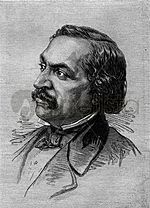Victor Séjour facts for kids
Quick facts for kids
Victor Séjour
|
|
|---|---|
 |
|
| Born | Juan Victor Séjour Marcou et Ferrand June 2, 1817 New Orleans, Louisiana |
| Died | September 20, 1874 (aged 57) Paris, France |
| Resting place | Père Lachaise Cemetery Paris, France |
| Occupation | Writer, novelist, playwright |
| Genre | Fiction |
Juan Victor Séjour Marcou et Ferrand (born June 2, 1817 – died September 20, 1874) was an American writer. He was a Creole of color, meaning he came from a mixed-race background in Louisiana. Victor Séjour spent most of his life in Paris, France. He was an expatriate writer, which means he lived and worked in a country different from his home country.
He wrote all his stories and plays in French. Even though he was not well-known in America for a long time, his short story "Le Mulâtre" ("The Mulatto") is very important. It is the first known story written by an African American author. In France, however, people knew him mostly for his plays.
Contents
About Victor Séjour's Life
Juan Victor Séjour was born on June 2, 1817, in New Orleans, Louisiana. His father, François Marcou, was a free man of color from Saint-Domingue (now Haiti). His mother, Eloisa Philippe Ferrand, was a New Orleans-born quadroon.
Victor's parents were wealthy. They made sure he got a good education at a private school. At that time, there were no public schools for people of color in New Orleans. Society was also separated by race.
Moving to Paris for Education
When Victor was nineteen, he moved to Paris. He wanted to continue his education and find work there. Many other free people of color from the United States, whose families had money, also went to Paris to study.
In Paris, Victor met important writers and artists. One of them was Cyrille Bissette. He was the publisher of a journal called La Revue des Colonies, which was owned by black writers.
His First Story: Le Mulâtre
Cyrille Bissette published Séjour's first story, "Le Mulâtre" (which means "The Mulatto"), in 1837. This story was written in French.
"Le Mulâtre" is about a loyal enslaved person. He seeks revenge on his cruel white enslaver, who is also his father. This happens after the enslaver causes the death of the enslaved person's wife. The story strongly speaks out against New World slavery. This strong message is not found in any of Séjour's later works.
Becoming a Playwright
After "Le Mulâtre", Victor Séjour stopped writing stories. In 1841, he wrote a poem about Napoleon.
He then started writing plays. His play The Jew of Seville was first performed in 1844. This play made him famous as a playwright. He also wrote Richard III, a play inspired by William Shakespeare. This play was about Richard III of England. It became Séjour's most praised work.
Later in his life, Séjour's plays became less popular. This caused his fame to decline.
Impact of Le Mulâtre
Because "Le Mulâtre" was written in French, it did not have much impact on American literature at the time. It was not translated into English until the late 1900s.
Only then did people in the United States start studying Séjour's work more. His strong message against slavery in "Le Mulâtre" was similar to the ideas of later African-American writers. These included Frederick Douglass and William Wells Brown.
The Brown Overcoat (1858)
In his plays, Victor Séjour usually did not talk about race. This is clear in his play The Brown Overcoat. This play was a typical comedy of its time. It had clever jokes and wordplay. It completely avoided talking about race or social issues.
Even so, Victor Séjour is still known as a great African-American playwright. He had a very successful career in France.
Personal Life
Victor Séjour was Catholic.
See also
 In Spanish: Victor Séjour para niños
In Spanish: Victor Séjour para niños
 | Laphonza Butler |
 | Daisy Bates |
 | Elizabeth Piper Ensley |

